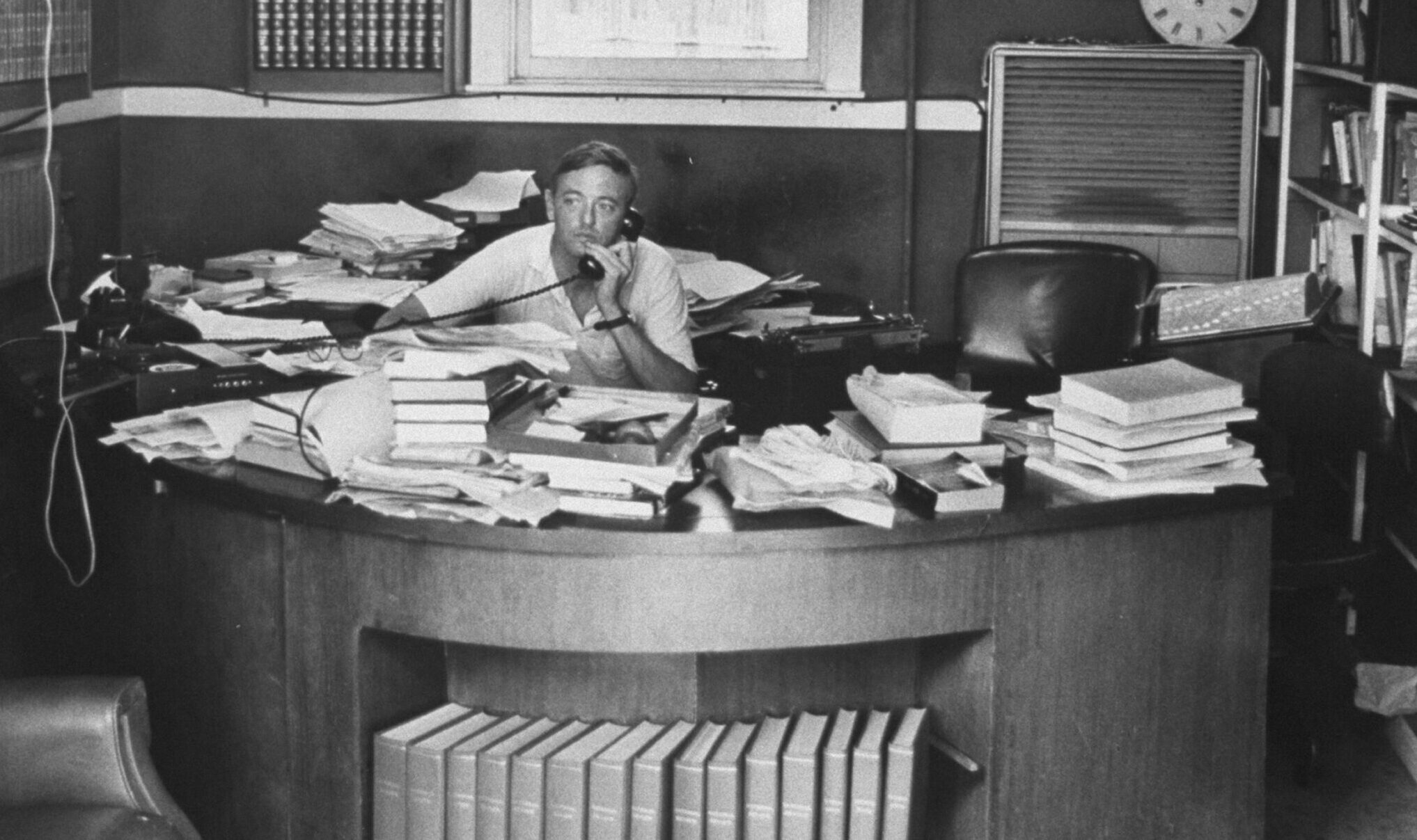Buckley the Maestro
A new book examines the late conservative grandee’s long love affair with classical music.

American Impresario: William F. Buckley, Jr. and the Elements of American Character
By Lawrence Perelman, Bombardier Books,
pp. 240, $18.99
At William F. Buckley, Jr.’s fortnightly musical salons, his socialite wife, Pat, liked to quip, “Bill married me for the piano.” The regal Austrian Bösendorfer, which was built in 1927, held pride of place in their Manhattan maisonette, where artists such as the Bach virtuoso Rosalyn Tureck performed for him and his guests. Until the very end of his life, when he died at age 82 in 2008, it remained a cherished source of music for Buckley.
Buckley’s passion for classical music had its sources in his childhood in Great Elm, a sprawling estate in Sharon, Connecticut that had been built by his rumbustious father, William Sr. This patriarch insisted that his progeny (10 in all) take weekly lessons on one of the estate’s pianos (five in all). Nor did their tuition end here. A compulsory listening session four times a week on a Capehart phonograph, supervised by one of the children’s tutors, Miss Penelope Oyen, was the essential bridge to the great composers of the past—not least Johann Sebastian Bach, whose third movement of the Brandenburg Concerto No. 2 would serve as the jaunty introduction to Buckley’s television show, Firing Line. In 1989, Buckley himself performed a Bach harpsichord concerto with the Phoenix Symphony, an experience that was close to a religious one for that devout Catholic.
In American Impresario, Lawrence Perelman contends that classical music wasn’t incidental to Buckley’s life and work. It was central to it. Buckley was wont to say that politics was his vocation, not his avocation. The latter designation probably best describes Buckley’s absorption with what he (with more than a little justice) liked to call “good music.”
Perelman, too, is an impassioned champion of it. A gifted pianist who emigrated in 1975 to Minnesota from the Soviet Union with his parents, he first met and performed for Buckley as a college student in Manhattan. Perelman explains how he and the progenitor of National Review ended up bonding over their shared love for Bach, Beethoven, and other musical titans. The result is an eloquent, absorbing, and heartfelt book.
Perelman observes that Buckley was a heroic figure in his Minneapolis home for his fervent anti-communist views. Indeed, Perelman was the only child in his third-grade class who had the temerity to raise his hand in favor of Ronald Reagan when he ran for reelection in 1984 against Walter Mondale, Minnesota’s native son. In 1994, after he entered the Manhattan School of Music, Perelman dispatched a letter to National Review’s office proposing that he perform on the piano for Buckley. Buckley agreed. Perelman was elated: “I felt like Charlie Bucket to Buckley’s Willy Wonka.” Upon entering Buckley’s upper East Side mansion, which Perelman describes as resembling something out of Downton Abbey, he performed Bach and Debussy before ending with Listz’s Transcendental Etude.
As Perelman’s studies progressed, he, like not a few aspiring professional musicians, came to realize that he simply didn’t have the goods to succeed as a concert pianist. Like Buckley, who had once harbored the dream of becoming a professional pianist, he would have to embark upon a different course. Here Buckley played a vital role in assisting Perelman. In 1998, Perelman sent Buckley a letter stating that he now hoped to focus on bolstering the popularity of classical music for a wider commercial audience, an ambitious goal that he has made his life’s mission.
Buckley arranged for his young admirer to meet with Schuyler Chapin, the commission of Cultural Affairs for New York, as well as to receive a $25,000 grant to study the state of music education in the city’s public schools. What amounted to an eleemosynary act played a pivotal part in advancing Perelman’s prospects. According to Perelman, “I was among many who had experienced Bill’s largesse and mentorship. It came naturally to him, the role of mentor and impresario. He was always looking for the opportunity to create opportunities for others. This was an incredible virtue that endeared him to so many.”
Perelman went on to become the head of a firm specializing in business strategy and public relations and serves as an adviser to the National Symphony Orchestra’s Gianandrea Noseda, among others. But all along he continued to fortify his friendship with Buckley, arranging for the pianist Simone Dinnerstein to give a private performance of Bach’s Goldberg Variations for Buckley towards the end of his life. Perelman himself played the Diabelli Variations for Buckley and was at his home in Connecticut when he died in 2008 at the age of 82.
Perelman ascribes Buckley’s facility as a writer to an early immersion in classical music. “My theory,” he writes, “is that the countless hours spent practicing piano as a child along with listening to classical music with his siblings four times a week played a major role in giving Bill an incredible amount of discipline along with enhancing his ability to speak and write melodiously, as a musician plays, sings, or composes a score.” But it’s also hard not to wonder whether classical music wasn’t also a source of repose for Buckley, whose otherwise frenetic schedule testifies to a perpetually restless nature.
Perelman himself notes that Bach was Buckley’s favorite composer. He goes on to state, “When looking back at the Buckley era from the 1950s to early 2000s, we can see that faith and music were central.” Bach’s music was steeped in religious devotion, ascending to an exalted level that has served as a source of inspiration for everyone from Felix Mendelssohn, who conducted the St. Matthew Passion in 1829 and again 1841, to Dmitri Shostakovich, who drew on the Well-Tempered Clavier for his own monumental 24 Preludes and Fugues. As Buckley astutely noted in a column celebrating Bach’s 300th birthday in 1985, “The music of Bach disturbs human complacency because one can’t readily understand finiteness in its presence.” Perelman concludes on a pensive note. He states that “Since Bill’s passing, we have continued to see the decline of the importance of transcendent values. A return to these values—whether religious or spiritual in nature—will benefit our nation in myriad ways.” Whether his counsel, at a moment of national turbulence, will be heeded is an open question. But in recounting his unlikely friendship with Buckley, Perelman has written a kind of Bildungsroman, one that highlights the ability of the sound of music to serve as the tie that binds and handsomely rewards his former mentor’s faith in him. That is firm enough ground to stand upon.
The post Buckley the Maestro appeared first on The American Conservative.

